Plenty more fish in the Brexit sea?
- Published
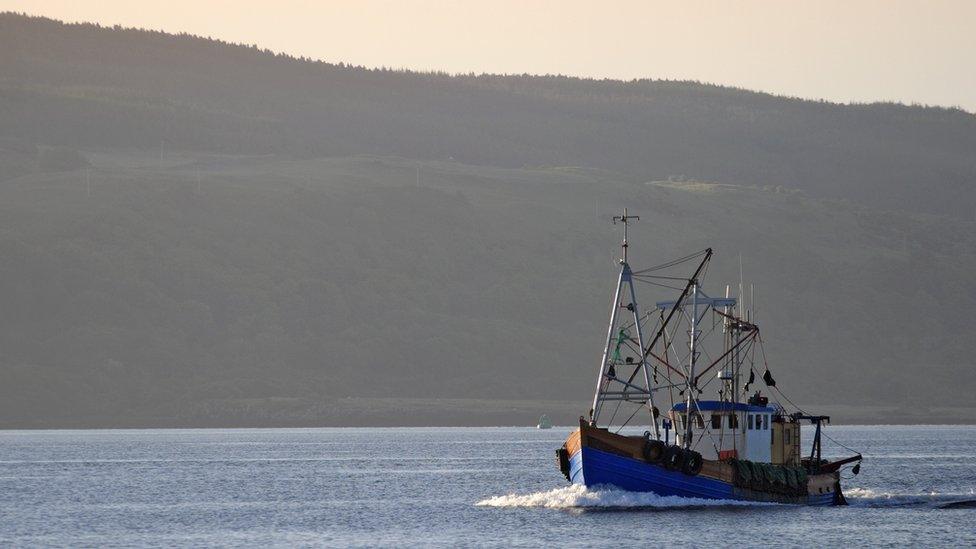
For the Brexit campaign, the Common Fisheries Policy is the best example of Brussels' malign influence over the things Britain holds dear. It stinks like a rotting kipper.
So it hurts a lot to find that the UK has agreed to stick with it, but without any influence over it, until the end of 2020, the end of transition to the post-Brexit world.
It would hurt a lot more if that then continues indefinitely, which is what the heads of government of the EU 27 have proposed.
The fisheries industry was described as "expendable" in private government papers at the time of Britain's accession. There were more important sectors to be prioritised in negotiations.
Having voted strongly in favour of "Leave" in 2016, there were high hopes in fishing communities of life beyond the Common Fisheries Policy (CFP). It was "a sea of opportunity", we kept hearing from the Scottish Fishermen's Federation.
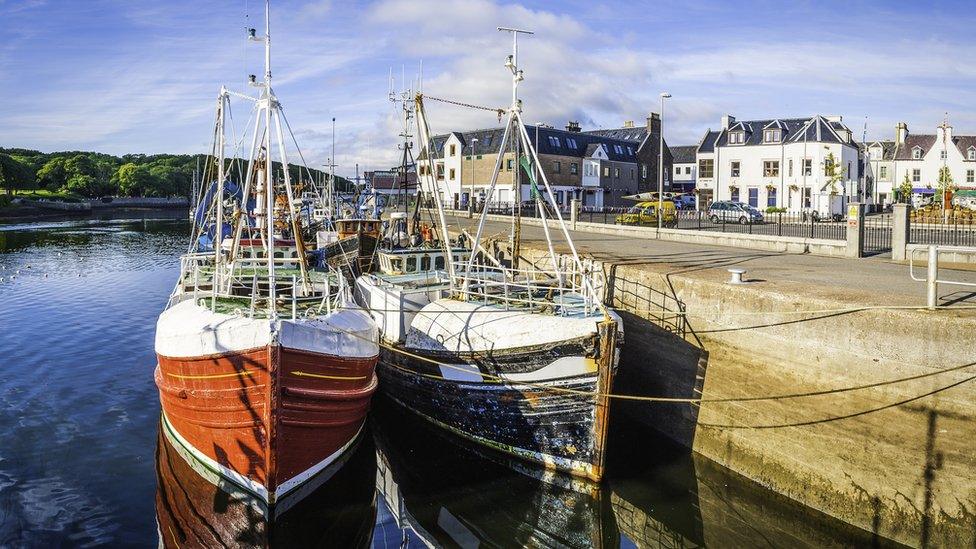
Many Scottish fisherman feel their interests are being sacrificed in the Brexit negotiations
But their fear is that they're going to be treated as expendable again. Not only are finance and car-making of much more significance to the British economy, and more likely to feature in the UK's negotiating priorities, but this is an issue on which the EU27 feel particularly strongly about denying Britain its wishes.
The positive spin from the UK government and Scottish Tories is that the capitulation over fisheries in the transition deal has pushed it towards the top of the prime minister's list of concerns.
It has put Scottish Tories in such an awkward place, and prominently so, that they would have to rebel and vote against the longer-term post-Brexit deal with the EU if there isn't a clear break with the past, and if full UK autonomy is not returned to its fisheries. Even with a few Scottish Tory rebels, the government's majority looks doubtful.
That's the politics. But what lies behind all this? What is it about the Common Fisheries Policy that made it such a bogeyman for the Brexiteers, the Eurosceptics and the fishermen? Let's take a closer look.
The CFP. It's been an unmitigated disaster, hasn't it?
You can argue that, if you only look at one side of the ledger. Over 35 years, it has forced skippers in this country to tie up their boats for half the year, or to scrap boats altogether.
Since 1996, there's been a 29% drop in the number of British fishing vessels, and the number employed, full and part time, has dropped from more than 20,000 to less than 12,000.
Landings in 1973, when Britain joined the CFP, were around one million tonnes. By 2016, they were 446,000 tonnes.
It has handed the majority of fishing rights in British waters to foreigners. A recent study at the University of the Highlands and Islands found non-British EU boats took 650,000 tonnes of fish and shellfish in a year from UK waters, worth more than £400m.
The policy has required discards of perfectly good fish, and only through a British public campaign is that practice being ended.
And another thing: it's decided by 28 ministers, some from countries with no coastline or fishing fleet. On average they've gone 20% above the safe and sustainable levels for fish stocks, as advised by marine biologists.
Steady on, there. It can't be all that bad, can it?
Well, no. It has given us the fishing fleet we have today. Investment is healthy, quotas have increased and the tonnage landed has been rising for Britain, but for few others. The British fleet is profitable and more so than most other EU countries, and there are healthy earnings for many.
The average earnings for around 6,000 Scottish fishermen are above £31,000 a year, according to the Scottish government. That includes some who are part-time, earning around £6000 on average on a small creel-boat.
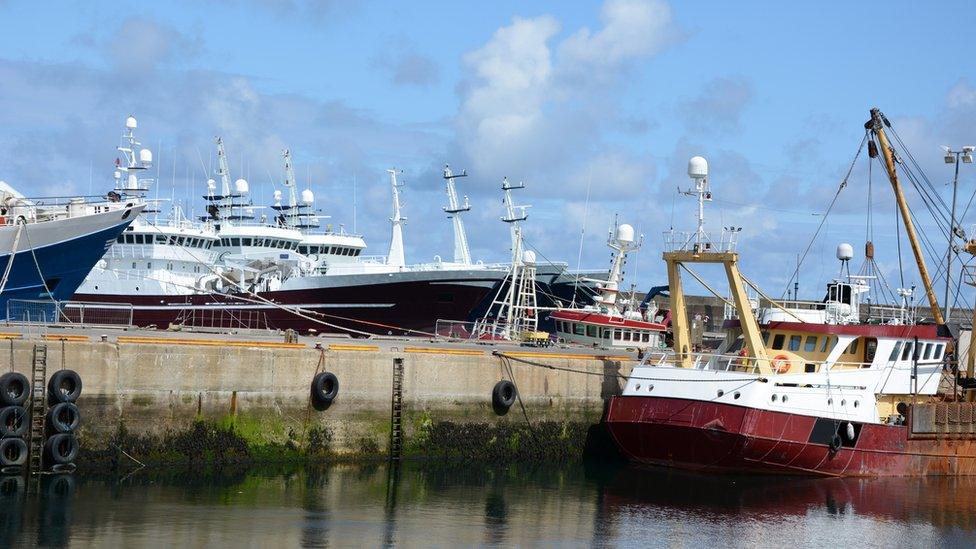
But for those in the white fish fleet, where earnings are based on a share of catch, recent surveys have found earnings average more than £100,000.
While EU boats fish in British waters, British boats can fish in other countries' waters. That UHI study reckoned on 90,000 tonnes being caught by British boats outside UK waters, worth £100m.
Meanwhile, most fish stocks in the North Sea and around the UK are now sustainable, with some having been close to collapse less than 20 years ago.
Some say the fishermen did that with changes to the way they fish, including innovation in net design to let smaller fish swim free. Whoever takes the credit, it's been achieved within the CFP.
But you're talking about the fleet as it is now. What happened to the fishing fleet when Britain joined the European Economic Community?
It's much smaller than it was - in tonnage, in landings, and in employment. But it was already in steep decline - steeper in the 25 years before joining the European Common Market than the 40 years after.
The fleet had to modernise, as every industry has done. That meant more efficiency. And with a finite resource of fish - becoming more scarce due to over-fishing - that meant fewer boats and fewer jobs.
You can blame some of that on the CFP's perverse way of working, but the fishermen surely have to take some of the blame for the over-fishing.
Yes, but why have British fishermen and fishing communities suffered worse than those in other countries?
Are you sure they have? Those same economic forces have been at work in every country, in and out of the CFP. The CFP happened to be the framework under which the shrinking took place, and Brussels represented a distant foreign bogeyman on which the blame could be placed.
But if you look at the Spanish fleet, for instance, it is bigger than the British one, but has shrunk in fleet tonnage and in tonnage of fish landed at a steeper rate in recent years.
According to Griffin Carpenter, a policy expert on all this at the New Economics Foundation, there have been similar processes at work in Norway and Iceland - two countries that stayed out of the EU, largely to protect their fishing rights.
How can it be fair that other European countries are entitled to take 60% to 70% of the total catch from British waters, through the CFP quota system?
The CFP began in 1983. It was based on the notion that there was a common fishery, not least because fish have a habit of swimming across boundaries.
In some cases, they do that over the course of their lifetimes, so you don't want to give one country's fishermen - the Danish, for example - an incentive to catch them close to their coast when the fish are young, and before they get a chance both to reproduce, and to swim into British waters where they can grow big and profitable.
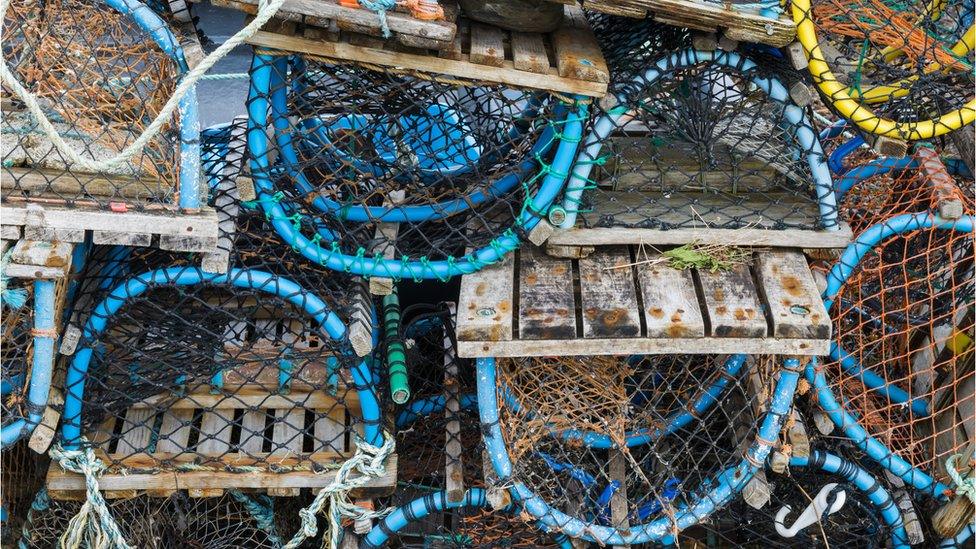
The Eurocrats had to find a way of allocating quota, rather than have a free for all. So they based national quotas on average catches from given sea areas over several years in the 1970s.
During that time, foreign boats were busy fishing in UK waters, while British boats were, among other things, fighting the Cod War with Iceland.
Why didn't Britain get more rights to fish in the waters of other countries?
That's because of those historic patterns, known in the jargon as 'relative stability'. The British won some quota in the waters of other EU countries.
And it's worth noting that the British boats have been going after fish they could sell back home, primarily cod and haddock. Prawns have become a much bigger fishery over the years.
Other countries' fleets were targeting fish and shellfish in UK waters that don't sell well in Britain but are highly valued elsewhere, including herring, saithe, hake, sprats and velvet crab.
That way, Europe's fishing fleets have specialised.
So we're stuck with the fishing patterns of the 1970s? Why not glam rock and flares as well?
I'll ignore your facetious tone. It demeans you. Those proportions have stuck since they were first set. The British and Irish might want to have them re-considered, but those who benefit most, led by the French, will work very hard to ensure that doesn't happen.
However, a reform programme is scheduled for 2022, and that is one of the main issues that is likely to be considered, partly because global warming has pushed fish north.
Even tuna and squid have turned up in British waters, but because they weren't there in the 1970s, there's no quota with which they can be legally caught.
What about those boats owned by foreign companies while using British quota? How can that be fair?
It's true that foreign-owned boats take a lot through the quota they've been given through the CFP, as we've discussed. In addition, others use British quota.
That's because a quota is an asset. It can be sold. So over the years, British skippers have seen the way the wind's blowing, and opted to sell their boat, its licence and its quota to the highest bidder.
Those bidders are often Spanish, French or Dutch corporations, through subsidiaries they legitimately set up in the UK. They can scrap the boat, while keeping its quota, consolidating that right to catch in new, bigger, more powerful and efficient boats.
Scottish pelagic fishermen, mainly going after mackerel and herring, have been very good at doing that too. A handful of them now make very handsome profits from working half the year in very large boats, where previously, there were many hundreds.
All that can change once Britain has left and "takes back control", right?
Probably not. Taking back control doesn't have to mean seizing assets from foreigners, for which they have a legal right, and for which they have paid. If Britain goes down that road, foreign investment will soon dry up.
What happens next is down to negotiations. Britain's negotiators have been firmly told at Westminster that the long-term deal with the EU27 cannot maintain the status quo. This is tightly enmeshed with Scottish politics and its constitutional question.
However, the EU27 may be just as determined that access to British waters should be maintained as it is now. In their guidelines for negotiations, published on Friday, fishing is the only industry named as requiring special attention by Monsieur Barnier's negotiating team.
They don't mean that, do they? It's just posturing
I refer you to their "posturing" on the transition talks, which turned out to give them everything they had wanted.
Both sides have relatively small numbers of people in fishing. But the communities are symbolic of an old Normandy, an old Galicia, and the quaint old port towns of Denmark, Holland and Ireland just as fishing resonates far beyond its true scale as symbolic of an old Scotland or Cornwall.
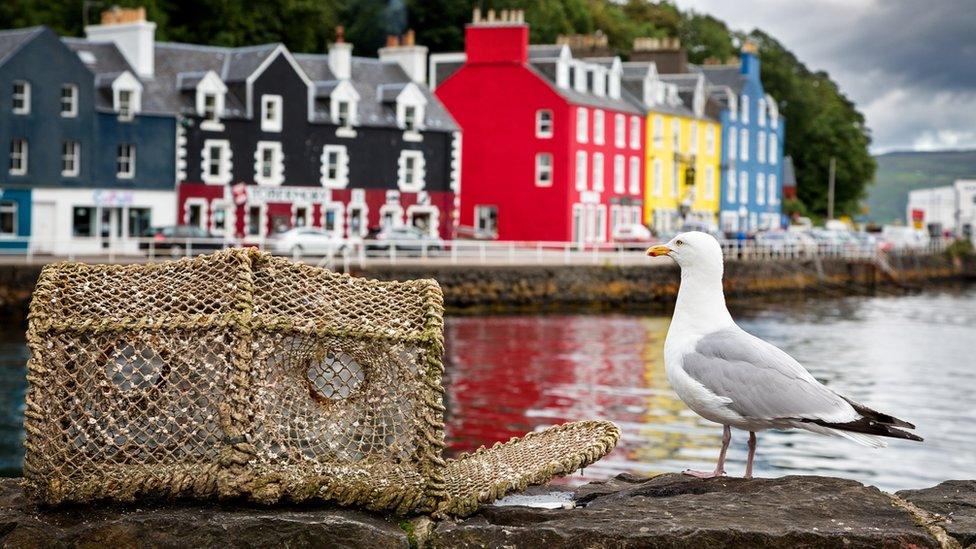
Both sides also have much bigger numbers in processing and in exporting. The UK has been a net importer of fish since 1984, but it still exports a lot - £1.6bn worth in 2016 - and much of that from Scottish processing plants.
So any deal on access to waters will have to be balanced with access to markets. That is, if Britain blocks access to its waters, it won't get easy access to sell into the EU. That's a particular concern for those in Scotland who catch high value shellfish, a lot of which they sell into France and Spain.
They could still sell into Europe, no doubt, but with a tariff imposed at the same rates paid on Norwegian imports to the EU. If negotiations go really badly, there could also be border delays, which are most costly for perishable product.
Can you think of any other country that has voted to leave the EU and wanted to keep European boats out of its waters?
As it happens, I can. Greenland voted to leave the EU in 1982. Control of fisheries was one of its top priorities. Negotiations went on for two years. It still had to let European boats into its waters.
Iceland has done well for its fisheries outside the CFP, hasn't it?
Yes. Fishing is a dominant industry, and one of the main reasons it does not want to join the EU. Being so distant from other countries, it has little reason to clash with neighbours. It put an exclusive economic zone around it shores, and benefited from global warming, in that fish have been swimming north and into its waters.
However, it has had to modernise and shrink its fleet too. And not everyone is happy in Iceland. It distributes its own quotas, and many of them go to the big fishing interests. Smaller coastal fishing boats have done less well, and the smaller communities in which they are based have been suffering from economic decline.
Why doesn't it distribute quota in different ways, the way Norway does?
Good question, and well spotted about Norway. It also has quota, but that is treated as a national asset, to be distributed on a regular basis. Once allocated, it cannot be sold on or leased.
Around 40% of Norway's quota is distributed to smaller boats, in an explicit effort to support the smaller communities where they are based.
And that is an approach being urged in Scotland by a new alliance of coastal inshore fishermen. The Clyde Fishermen's Association has joined with those from the Western Isles, Orkney, Dunbar and Galloway.
They don't like the dominant voices within the Scottish Fishermen's Federation, which speak up for the bigger boats in the white fish fleet. That mainly means the north-east ports.
So once Britain is out of the CFP, the allocation of quotas could be changed radically?
Nearly right. The allocation of quota is not down to Brussels. National governments choose the way they wish to allocate quota, so the Scottish government could make such changes without leaving the CFP.
Why doesn't it do that?
I assume, from that question, that you haven't looked at the political map of Scotland recently.